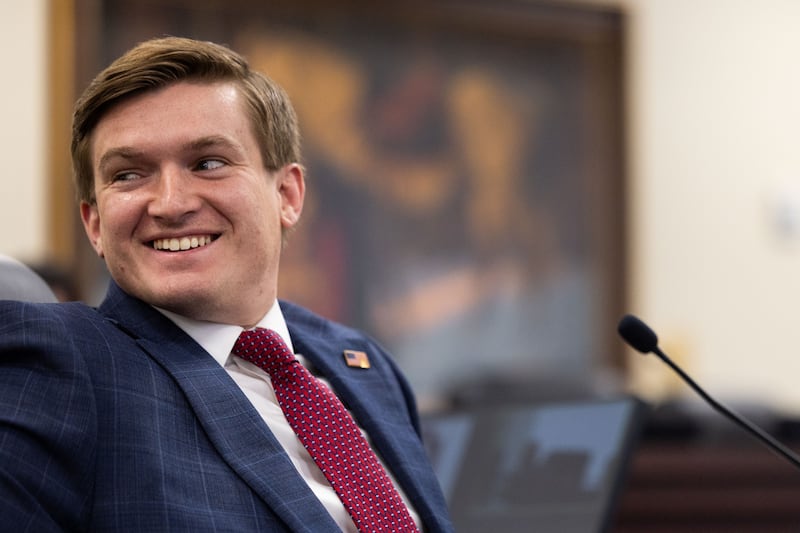With hardly one year in public office under his belt, the 26-year-old Rep. Tyler Clancy, R-Provo, has his eyes set on some of Utah’s, and the nation’s, most intractable problems.
Even though it’s early in the 2024 legislative session, the state’s youngest lawmaker has introduced legislation tackling air quality, homelessness, civil commitment, sexual assault and centralized digital currencies, among other issues. But this eclectic collection of bills all have something in common, Clancy said.
“Utah taxpayers are asked to foot bills for a lot of different challenges. I want to make sure that the governance behind those systems and the implementation is serving the taxpayers well, and it’s implemented effectively,” Clancy said.
The example that comes readily to mind for Clancy is homelessness. Government programs aimed at helping individuals who are experiencing homelessness must be built on data that accurately reflects common causes as well as diverse circumstances, Clancy said. But these programs must also show a measurable return on investment “making sure that we’re not asking people to foot a higher and higher bill without anything to show for it.”
What should Utah do about homelessness and mental health?
A Provo police officer by trade, Clancy has seen the outcomes of effective, and ineffective, government policy reflected in the situations he is called to respond to on the job. Bringing this experience, as well as what he learned as the former executive director of a nonprofit analyzing homelessness services in Utah, Clancy has introduced HB298.
The bill would change the membership of the executive committee of the Utah Homelessness Council; clarify the state’s goal of reaching a “functional zero” level of homelessness, where the number of individuals exiting homelessness exceeds the number entering it; and outline additional data that must be gathered by the Office of Homeless Services — because, Clancy said, each homeless person requires “a completely different policy intervention” from the state.
“If we lump them all together and say, let’s find a solution, it’s not going to work,” Clancy said. “You’ve seen in San Francisco, Seattle, skid row in Los Angeles, you see this one-size-fits-all approach. They double, triple down and the problem persists. And so we’re trying to get ahead of that.”
Clancy is approaching this difficult subject from one more angle — one endorsed by Utah Gov. Spencer Cox — to expand resources for the mentally ill, including those who are civilly committed, so that they can receive proper treatment, instead of relying only on law enforcement to take action.
“Right now our biggest mental health providers are our county jails and our state prison,” Clancy said. “And that’s because certain people, they’re very mentally ill and they don’t even know that they need help sometimes. And that illness causes them to act out behaviorally, which causes a law enforcement response.”
Clancy said he’s experienced this outcome firsthand as a police officer and that lawmakers need to rethink how to keep communities safe while also helping those suffering from mental illness.
“It’s not compassionate to people experiencing severe persistent mental illness, who are having episodes on the street, and it’s not compassionate to Utahns in the community either, to not address that,” Clancy said.
The current version of Clancy’s bill, HB299, seeks nothing short of the complete revamping of the state’s mental hospital capacity. It would require state agencies to sell the Utah State Hospital property in Provo and use the proceeds to develop a multiple-facility model to spread state hospital resources across Utah. It would also create a self-funded revenue stream for mental health resources and amend the procedure a court may use to order the the involuntary commitment of an individual with a mental illness.
‘Shooting big and starting a conversation’
Clancy recognizes this bill is a big lift. But it is the “sticker shock” of his proposals, he said, that convinces fellow legislators and stakeholders that he is serious about getting at the root of the problem.
“I recognize that a lot of these initiatives I’m kind of shooting big and starting a conversation,” Clancy said. “That’s what I want it to do. I wanted to be forthright, transparent about these missions and goals. And it’s worked, it’s brought people to the table.”
Clancy hopes to do the same for air quality, where he has proposed state goals for emissions reductions, and on the issue of centralized digital currencies.
Clancy presented a bill, HB164, to committee on Tuesday that would prohibit Utah from recognizing a federal digital money system as legal tender. Such currencies are being developed in other countries, and looked at by the U.S. Federal Reserve, and Clancy said they would pose a threat to personal privacy and freedom because they could potentially give the government the ability to track transactions and block bank accounts. His bill would send a preemptive message to the Biden administration, according to Clancy.
To address the “challenges and opportunities” that face the state, Clancy said, lawmakers have to “think big.” But that doesn’t mean abandoning conservative principles of limited government and fiscal restraint.
“We’ve got to get past the one-size-fits-all, government top-down solutions and start, in my opinion, from the street up,” Clancy said. “Let’s make sure that our policies are informed by people who have lived these experiences and have moved on, whether it’s homelessness or mental health, or whatever, and I think we can make a better future for all of us.”


